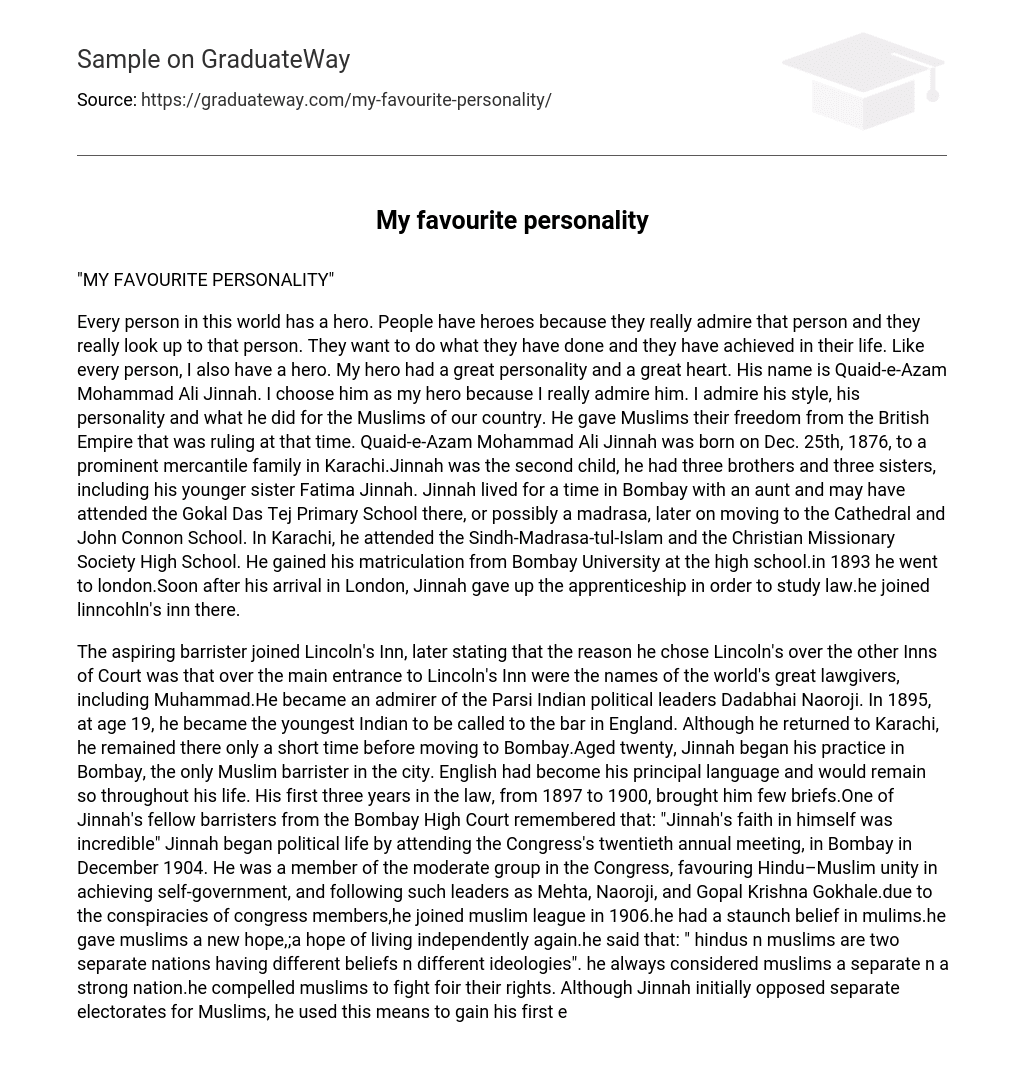Every person in this world has a hero. People have heroes because they really admire that person and they really look up to that person. They want to do what they have done and they have achieved in their life. Like every person, I also have a hero. My hero had a great personality and a great heart. His name is Quaid-e-Azam Mohammad Ali Jinnah. I choose him as my hero because I really admire him. I admire his style, his personality and what he did for the Muslims of our country. He gave Muslims their freedom from the British Empire that was ruling at that time. Quaid-e-Azam Mohammad Ali Jinnah was born on Dec. 25th, 1876, to a prominent mercantile family in Karachi.Jinnah was the second child, he had three brothers and three sisters, including his younger sister Fatima Jinnah. Jinnah lived for a time in Bombay with an aunt and may have attended the Gokal Das Tej Primary School there, or possibly a madrasa, later on moving to the Cathedral and John Connon School. In Karachi, he attended the Sindh-Madrasa-tul-Islam and the Christian Missionary Society High School. He gained his matriculation from Bombay University at the high school.in 1893 he went to london.Soon after his arrival in London, Jinnah gave up the apprenticeship in order to study law.he joined linncohln’s inn there.
The aspiring barrister joined Lincoln’s Inn, later stating that the reason he chose Lincoln’s over the other Inns of Court was that over the main entrance to Lincoln’s Inn were the names of the world’s great lawgivers, including Muhammad.He became an admirer of the Parsi Indian political leaders Dadabhai Naoroji. In 1895, at age 19, he became the youngest Indian to be called to the bar in England. Although he returned to Karachi, he remained there only a short time before moving to Bombay.Aged twenty, Jinnah began his practice in Bombay, the only Muslim barrister in the city. English had become his principal language and would remain so throughout his life. His first three years in the law, from 1897 to 1900, brought him few briefs.One of Jinnah’s fellow barristers from the Bombay High Court remembered that: “Jinnah’s faith in himself was incredible” Jinnah began political life by attending the Congress’s twentieth annual meeting, in Bombay in December 1904. He was a member of the moderate group in the Congress, favouring Hindu–Muslim unity in achieving self-government, and following such leaders as Mehta, Naoroji, and Gopal Krishna Gokhale.due to the conspiracies of congress members,he joined muslim league in 1906.he had a staunch belief in mulims.he gave muslims a new hope,;a hope of living independently again.he said that: ” hindus n muslims are two separate nations having different beliefs n different ideologies”. he always considered muslims a separate n a strong nation.he compelled muslims to fight foir their rights. Although Jinnah initially opposed separate electorates for Muslims, he used this means to gain his first elective office in 1909, as Bombay’s Muslim representative on the Imperial Legislative Council.Jinnah was also appointed to a committee which helped to establish the Indian Military Academy in Dehra Dun.quaid e azam was a dynamic leader.he devoted himself fully to the affairs of the muslim league.he presented the demands of the muslims in his famous “Fourteen Points ” at the roundtable conference in London.
Beginning in 1933, Indian Muslims, especially from the United Provinces, began to urge Jinnah to return to India and take up again his leadership of the Muslim League, an organisation which had fallen into inactivity. He remained titular president of the League,but declined to travel to India to preside over its 1933 session in April, writing that he could not possibly return there until the end of the year.In the next two years, Jinnah worked to build support among Muslims for the League. He secured the right to speak for the Muslim-led Bengali and Punjabi provincial governments in the central government in New Delhi (“the centre”). He worked to expand the league, reducing the cost of membership to two annas (? of a rupee), half of what it cost to join the Congress. He restructured the League along the lines of the Congress, putting most power in a Working Committee, which he appointed.[84] By December 1939, Liaquat estimated that the League had three million two-anna members. In a speech given at Allahabad to a League session in 1930, Sir Muhammad Iqbal called for a state for Muslims in India.
Choudhary Rahmat Ali published a pamphlet in 1933 advocating a state “Pakistan” in the Indus Valley, with other names given to Muslim-majority areas elsewhere in India.[87] Jinnah and Iqbal corresponded in 1936 and 1937; in subsequent years, Jinnah credited Iqbal as his mentor, and used Iqbal’s imagery and rhetoric in his speeches. On 14 August, Pakistan became independent; Jinnah led the celebrations in Karachi.one observer wrote, “here indeed is Pakistan’s King Emperor, Archbishop of Canterbury, Speaker and Prime Minister concentrated into one formidable Quaid-e-Azam.”[148] From the 1930s, Jinnah suffered from tuberculosis; only his sister and a few others close to him were aware of his condition. Jinnah believed public knowledge of his lung ailments would hurt him politically.By 9 September, Jinnah had also developed pneumonia. Doctors urged him to return to Karachi, where he could receive better care, and with his agreement, he was flown there on 11 September. Jinnah died at his home in Karachi on 11 September 1948, just over a year after Pakistan’s creation.Jinnah was buried on 12 September 1948 amid official mourning in both India and Pakistan; a million people gathered for his funeral. Indian Governor-General Rajagopalachari cancelled an official reception that day, in honour of the late leader. Today, Jinnah rests in a large marble mausoleum, Mazar-e-Quaid, in Karachi.





